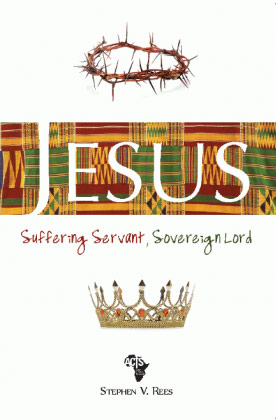
Rees, Stephen V. Jesus: Suffering Servant, Sovereign Lord. Nairobi: African Christian Textbooks, 2012. 181 pp. ISBN 978-9966-1655-1-0
The Prosperity Gospel is dangerously wrong. Upon reading Stephen Rees’ book readers will see that Rees demonstrates this point from several different approaches. As the title suggests, Rees’ first approach is that of the Servant Songs in Isaiah. His second approach is an exegetical analysis and application to the lives of believers of Philippians 2. His final approach is an unpacking and explanation of the biblical concept of the New Heaven and the New Earth.
Rees is a pastor at Grace Baptist Church in Stockport, UK, where he has been serving since its founding in 1984.[1]Pastor Rees studied classics and theology at Cambridge University. In addition to his pastoral duties, Rees also speaks at conferences around the world.[2]The church’s website is regularly updated with blog posts.
The first four chapters of this book are sermons on the Servant Songs in Isaiah. As one reads these chapters, their origins as sermons is clear, as the language is very oral. Rees writes about the Servant’s Mission, Story, Obedience, and Reward, respectively. The content of these four chapters are connected to one another. Chapter one is an exposition of Isaiah 42:1-9. Chapter two’s sermon is from Isaiah 49:1-9. Chapter three explains Isaiah’s message in 50:4-11. Finally, chapter four is based on Rees’ sermon on Isaiah 52:13-53:12.
According to the Preface’s author Martin Bussey, the remaining three chapters are also sermons. However, it is not clear upon reading these chapters if the fifth and sixth chapters were first delivered as sermons or if they were originally written and later preached. Based on the style of writing, the final chapter on The New Heaven and the New Earth seems to have had its origin as a written chapter. Whatever their origins, these seven chapters serve as salvos against Neo-Pentecostalism and specifically the Prosperity Gospel.
The nature of this book as a collection of sermons precludes an overarching narrative in the book, but, as mentioned above, the book is successful in critiquing the Prosperity Gospel. Instead of a polemical approach to this task, however, the author critiques the Prosperity Gospel by showing a better way. He accomplishes this critique through modeling and teaching.
By modeling sound exegesis, the author provides a tacit critique of the Prosperity Gospel — where sound exegesis is almost always lacking. For instance, Rees’ exegesis of Isaiah 42 is correctly interpreted by placing both in its literary setting in Isaiah and in its setting in the overarching Biblical storyline.
By providing clear and faithful biblical teaching, the author also critiques the Prosperity Gospel by presenting the historical and biblical Jesus and not the Jesus of the Prosperity Gospel. Rees’ seventh and final chapter demonstrates that the reality of the New Heaven and New Earth gives us an answer to the Prosperity Gospel’s emphasis on the material by showing that the Bible does promise material blessing by emphasizing that hope is deferred.
At different points in the book the author mentions that he is both Reformed and Baptist. These two points of view inform the way that he interprets Scripture. For instance, when discussing the reward of the servant, Rees writes that the atoning work of Christ is “particular” (89). He points to the fact Isaiah 53:8 speaks of the Servant being stricken for “my people.” It is not clear from Isaiah 53:8 whether the atonement is particular or universal, and Rees’ main point about the achievement and reward of the Servant in Isaiah does not depend on either interpretation.
This book is easy to read. It contains no footnotes, endnotes, or parenthetical notes. The author frequently asserts that he will prove his thesis through various lists (e.g. “four ways,” or “five things”). Unlike some authors, he is consistently clear in the subsequent sentences and paragraphs in following up on those points.
The author is clearly addressing a Western audience. Many of his references and applications come from Western figures – both historical and mythical. For instance, he writes about King Arthur and Alexander (53), Plato (34), as well as Henry Martyn, Mary Slessor, and Amy Carmichael (93). While an educated Western Christian reader will understand many (if not all) of these references, they will be lost on some readers in Africa – where the book was published and printed.
Taken together, I believe that this book will be an encouragement to most readers to believe in and proclaim the true Gospel. As mentioned above, the author’s critique of the Prosperity Gospel is helpful, needed, and clear. Those looking for a robust critique of Neo-Pentecostalism and the Prosperity Gospel should probably look elsewhere, but if one is seeking a winsome alternative to these false doctrines, then Rees’ book is a good place to start.
Phil Barnes serves as a lecturer and Interim Academic Dean at The Baptist Theological Seminary of Malawi in Lilongwe, Malawi. His focus is teaching Missions and World Religions. He holds a MDiv and a PhD from The Southern Baptist Theological Seminary in Louisville, USA. Phil and his wife Laura have been married for almost 22 years and have 2 sons: Daniel and Jonathan.
[1] “Stephen Rees – Pastor,” available from http://www.gbcstockport.org.uk/about/stephen-rees; accessed on 13 December 2018.
[2]Ibid.



